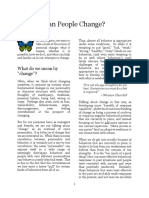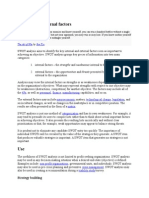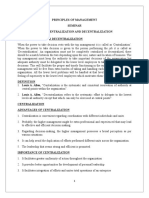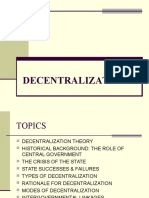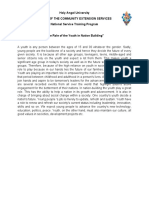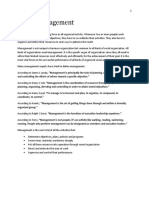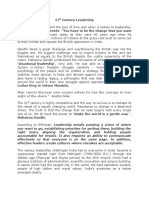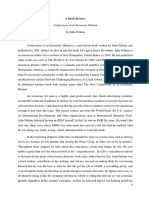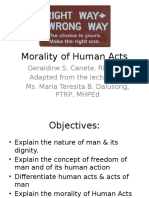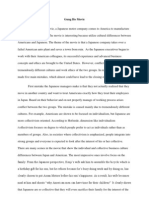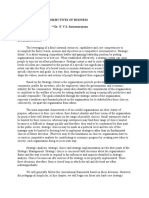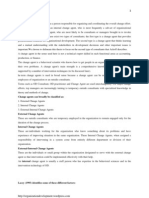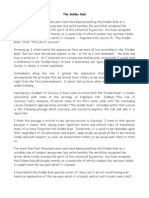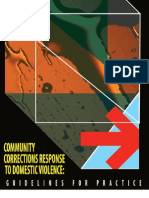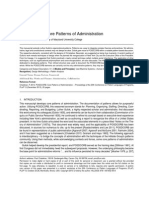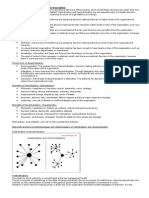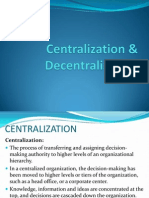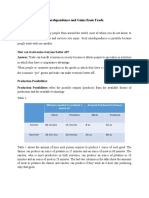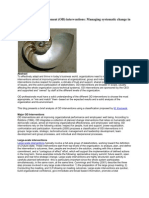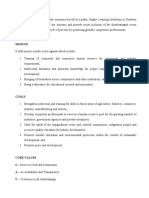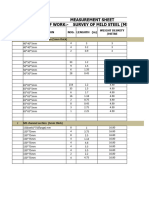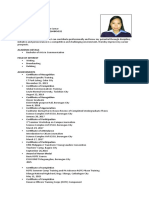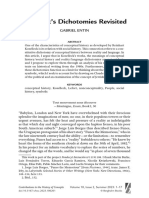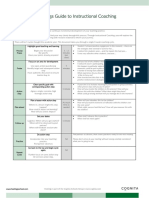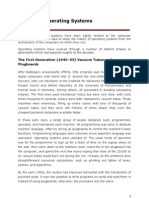Definition of Good Governance
Definition of Good Governance
Uploaded by
Haziq KhanCopyright:
Available Formats
Definition of Good Governance
Definition of Good Governance
Uploaded by
Haziq KhanOriginal Description:
Copyright
Available Formats
Share this document
Did you find this document useful?
Is this content inappropriate?
Copyright:
Available Formats
Definition of Good Governance
Definition of Good Governance
Uploaded by
Haziq KhanCopyright:
Available Formats
Definition of Good Governance
The Quran defines good governance as the rule of justice, a just and ethical
order and observance of rights and obligations in a society. The Quran declares:
Those when given authority in land, establish (system of) salah , give zakah and
enjoin what is good (maruf ) and forbid what is wrong ( munkar ). al-Hajj 22:41.
Islamic view of good governance is qualitative and believes that how your values
and ethical decision affect the society are important. It believes in participatory
approach, in public accountability Aithesab, equality etc. The last sermon of the
Prophet (Peace be upon him) is an effective example of an effective policy and
system that if followed with true spirit will result in good governance.
According to the World Bank (1992),
the manner in which public officials and institutions acquire and exercise the
authority to shape public policy and provide public goods and services"
Governance refers to the manner in which public officials and institutions acquire
and exercise the authority to shape public policy and provide public goods &
services.
Improving Governance in Pakistan
Below are some concluding thoughts that can be considered to improve Good
Governance in Pakistan.
1. Strengthening Institutions not individuals - but empowering individuals to
participate in the process of improvement for sustainability.
2. Decentralization of Power - from the center but also from the elite politicians
and feudal lords for ensuring grass root improvements.
3. Right person for the right job continuous professional development
throughout for accountability and sharing of responsibility.
4. Sustainability by building on success The trend in Pakistan is to abolish
the previous governments good efforts and re-invent the step which causes hurdles
in sustainability. Governments should build on previous success irrespective of
whose initiative was it for sustainability in governance.
5. Learning from likeminded countries and cultures as opposed to western
systems. Pakistan has inherited the system from the British and have continued to
follow the same system which has caused problems in managing it due to lack of
knowledge and capacity of human resources. Culture and tradition play a role and
perhaps Pakistan can better learn from similar developing countries like Malaysia as
opposed to European countries which have been the case in the past.
6. Respecting and accepting diversity. Encouraging and promoting diversity as
strength for attaining success. Creating and respecting diversity as a dividend not
divide.
7. Urbanization in rural areas to manage and facilitate population. Too
much migration in urban cities for employment causes issues of management and
population influx. Rural areas should be developed in order to maintain and
encourage good governance through decentralization.
8. Do it Yourself (DIY) As opposed to waiting for donors and other agencies to
help us in various sectors which perhaps in normally considered a hindrance as
donors have their own set objectives. A mindset that will be difficult to change but
possible through strong campaigning. Spreading the notion of Khudee / Self
Actualization and believe in one self.
You might also like
- Can People Change? - Bradford and HuckabayDocument4 pagesCan People Change? - Bradford and HuckabaysiriNo ratings yet
- Broken Window TheoryDocument3 pagesBroken Window TheoryKristine Guia CastilloNo ratings yet
- Leadership Action PlanDocument6 pagesLeadership Action Planapi-298467341No ratings yet
- 5 Why Root Cause AnalysisDocument1 page5 Why Root Cause AnalysisSinan İcik100% (1)
- Explain SwotDocument6 pagesExplain Swottapan mistryNo ratings yet
- Internal and External Factors: The Art of War Sun TzuDocument3 pagesInternal and External Factors: The Art of War Sun Tzumohsin_20008896No ratings yet
- Centralization and Decentralization PM 2Document7 pagesCentralization and Decentralization PM 2meena plNo ratings yet
- Centralization and DecentralizationDocument7 pagesCentralization and DecentralizationwimpimorganNo ratings yet
- Environmental-Scanning 6Document14 pagesEnvironmental-Scanning 6Mansour HamjaNo ratings yet
- DecentralizationDocument20 pagesDecentralizationLaurens BuloNo ratings yet
- The Role of The Youth in Nation BuildingDocument1 pageThe Role of The Youth in Nation Buildingarrian arraNo ratings yet
- Conceptualization of Planned ChangeDocument4 pagesConceptualization of Planned ChangeAnisNo ratings yet
- Decision MakingDocument36 pagesDecision MakingVhal MarcosNo ratings yet
- Strategic Management - An IntroductionDocument8 pagesStrategic Management - An IntroductionAbhishek JhaNo ratings yet
- Define ManagementDocument2 pagesDefine Managementadhara100% (1)
- Characteristics of An Effective LeaderDocument9 pagesCharacteristics of An Effective LeaderNurul Azrianti AzizNo ratings yet
- Transparency in Phillipines Through Media and CitizensDocument156 pagesTransparency in Phillipines Through Media and CitizensUltimate Multimedia ConsultNo ratings yet
- 21st Century LeadershipDocument5 pages21st Century LeadershipJacob Mathew PulikotilNo ratings yet
- Book Review of Economic HitmanDocument2 pagesBook Review of Economic HitmanAulia Dyah RahmayantiNo ratings yet
- Humanacts 140623005104 Phpapp02Document32 pagesHumanacts 140623005104 Phpapp02Alvin Minero100% (1)
- Definition of ManagementDocument3 pagesDefinition of ManagementHaziq HilmeNo ratings yet
- Human Relations Approach TheoriesDocument17 pagesHuman Relations Approach TheoriesSayam RoyNo ratings yet
- Term Paper 2 - SONADocument8 pagesTerm Paper 2 - SONAElaine RelucioNo ratings yet
- CHAPTER 2 (I) - FACTORS (INTERNAL AND EXTERNAL) THAT INFLUENCE STRATEGIC MANAGEMENT IN PUBLIC ORGANIZATIONSDocument12 pagesCHAPTER 2 (I) - FACTORS (INTERNAL AND EXTERNAL) THAT INFLUENCE STRATEGIC MANAGEMENT IN PUBLIC ORGANIZATIONSNajib IsahakNo ratings yet
- Gung Ho MovieDocument5 pagesGung Ho Movielyudmila71No ratings yet
- VISION, Mission, Objectives of BusinessDocument15 pagesVISION, Mission, Objectives of BusinesssjanseerNo ratings yet
- Change AgentDocument3 pagesChange AgentAlamin SheikhNo ratings yet
- Unintended Consequences PIDSDocument210 pagesUnintended Consequences PIDSAlanNo ratings yet
- Finance For Non Finance ExecutivesDocument5 pagesFinance For Non Finance ExecutivesPahladsinghNo ratings yet
- The Golden RuleDocument2 pagesThe Golden RulerahulkaveNo ratings yet
- Ethics Reflection Paper (Rev 2)Document8 pagesEthics Reflection Paper (Rev 2)Kenneth RossNo ratings yet
- Administrative Communication Is Any Communication IntendedDocument32 pagesAdministrative Communication Is Any Communication IntendedChristian Erryl100% (1)
- Qualities of Effective Leadership and Its Impact On Good GovernanceDocument14 pagesQualities of Effective Leadership and Its Impact On Good GovernanceKuthe Ig TootsNo ratings yet
- DOH Reengineering MonographDocument175 pagesDOH Reengineering MonographAnonymous NNbBGPsNo ratings yet
- Group-3-Leadership and EmpowermentDocument30 pagesGroup-3-Leadership and EmpowermentBon Carlo MelocotonNo ratings yet
- MGT1023-Fundamentals of Human Resource Management Digital Assignment - 1Document5 pagesMGT1023-Fundamentals of Human Resource Management Digital Assignment - 1Ram Prasad ReddyNo ratings yet
- Organisation ChangeDocument15 pagesOrganisation ChangeAssignmentLab.com100% (1)
- How Kristin Died Notes 2Document220 pagesHow Kristin Died Notes 2meganpappasNo ratings yet
- Entrepreneurial Leadership - An Emerging TheoryDocument19 pagesEntrepreneurial Leadership - An Emerging TheoryStarNo ratings yet
- POSDCORB: Core Patterns of Administration: Recognition) : Design Methodology-Pattern AnalysisDocument20 pagesPOSDCORB: Core Patterns of Administration: Recognition) : Design Methodology-Pattern AnalysisJofil LomboyNo ratings yet
- 11-Ways To Motivate Your TeamDocument3 pages11-Ways To Motivate Your TeamAhmad KhurshidNo ratings yet
- What Is Public PolicyDocument6 pagesWhat Is Public PolicyAbharika SharmaNo ratings yet
- Handouts MPA 401Document28 pagesHandouts MPA 401Muhammad Imran Irshad JalloNo ratings yet
- Comparative Public PolicyDocument20 pagesComparative Public PolicyWelly Putra JayaNo ratings yet
- Centralization and DecentralizationDocument4 pagesCentralization and DecentralizationR Al PH100% (1)
- Sustainable Development PPT by Sagar 10CDocument12 pagesSustainable Development PPT by Sagar 10CSeema DayalNo ratings yet
- Centralization & DecentralizationDocument12 pagesCentralization & DecentralizationUnnati BisaniNo ratings yet
- Leadership and GovernanceDocument26 pagesLeadership and GovernanceyousafNo ratings yet
- Case Study - China in AfricaDocument5 pagesCase Study - China in AfricaLouise Nichole JucomNo ratings yet
- Organizational AnalysisDocument7 pagesOrganizational AnalysisNursePearsonNo ratings yet
- Interdependence and Gains From TradeDocument5 pagesInterdependence and Gains From TradeDolphNo ratings yet
- Journal Critique PaperDocument4 pagesJournal Critique PaperRichard Abangan Jr.No ratings yet
- Alex B. Brillantes JR - The State Reform of The State Bureaucracy and Building Capacities For DecentralizationDocument13 pagesAlex B. Brillantes JR - The State Reform of The State Bureaucracy and Building Capacities For DecentralizationhamaredNo ratings yet
- How Patriarchy Affects The Way We Think: Powerpoint DR Cathy Higgins Sept 2014Document27 pagesHow Patriarchy Affects The Way We Think: Powerpoint DR Cathy Higgins Sept 2014whatamjohnbny100% (1)
- OD InterventionsDocument3 pagesOD InterventionsYash GuptaNo ratings yet
- Nature and Concepts of PlanningDocument8 pagesNature and Concepts of PlanningRonan FerrerNo ratings yet
- Reflective Essay Dissertation 13a: Brian Nsubuga KaayaDocument3 pagesReflective Essay Dissertation 13a: Brian Nsubuga KaayaBrian KaayaNo ratings yet
- Module 2020-2021Document190 pagesModule 2020-2021Asyed Silayan Zaportiza100% (1)
- The Philippines Country Knowledge Strategy and Plan, 2012–2017: A Knowledge CompendiumFrom EverandThe Philippines Country Knowledge Strategy and Plan, 2012–2017: A Knowledge CompendiumNo ratings yet
- The Abcs of Ethics: A Resource for Leaders, Managers, and ProfessionalsFrom EverandThe Abcs of Ethics: A Resource for Leaders, Managers, and ProfessionalsNo ratings yet
- Test Result 3rd GradingDocument61 pagesTest Result 3rd GradingMark Anthony QuilestinoNo ratings yet
- Artistic Unit Lesson PlanDocument4 pagesArtistic Unit Lesson Planapi-242483208No ratings yet
- Particle Swarm Optimization Algorithm-An OverviewDocument22 pagesParticle Swarm Optimization Algorithm-An Overviewamreen786No ratings yet
- MCSE 05 Implementing of A Network Infrastructure 05 TheoryDocument36 pagesMCSE 05 Implementing of A Network Infrastructure 05 Theorysivasankar015No ratings yet
- Wazwaz IEch 3 S 2 S 5 P 4Document1 pageWazwaz IEch 3 S 2 S 5 P 4ShaMIiii JuTTNo ratings yet
- Survey of Steel SectionDocument4 pagesSurvey of Steel SectionShubham KNo ratings yet
- Cycle Time Reduction Through Jishuken Activity and Low Cost Automation (Lca)Document7 pagesCycle Time Reduction Through Jishuken Activity and Low Cost Automation (Lca)International Journal of Application or Innovation in Engineering & ManagementNo ratings yet
- Marjorie BDocument3 pagesMarjorie BMarjo AldeNo ratings yet
- Business DynamicsDocument19 pagesBusiness Dynamicsrks9986No ratings yet
- Module 1 PDFDocument191 pagesModule 1 PDFshine sunnyNo ratings yet
- GSK in ChinaDocument4 pagesGSK in ChinaHarshParmarNo ratings yet
- ABA 33rd Annual Land Use Institute Brochure 4-2019Document10 pagesABA 33rd Annual Land Use Institute Brochure 4-2019RHTNo ratings yet
- Design Thinking Unit3 FinalDocument32 pagesDesign Thinking Unit3 FinalNandan KuchabalNo ratings yet
- Changeling The Lost - House RulesDocument91 pagesChangeling The Lost - House Rulesclotho19100% (3)
- Hemant Rana SFDC Consultant NewDocument6 pagesHemant Rana SFDC Consultant NewHemant RanaNo ratings yet
- User Manual: HMC9000A Diesel Engine ControllerDocument46 pagesUser Manual: HMC9000A Diesel Engine ControllerArc HieNo ratings yet
- Kosellecks Dichotomies RevisitedDocument1 pageKosellecks Dichotomies RevisitedRevista Argentina de Ciencia PolíticaNo ratings yet
- Types of SpeechDocument26 pagesTypes of SpeechJulieSanchezErsando75% (4)
- Fuel Cell SOFC - Zirconia - Sinterização - Eletrólito - YSZ - BMICDocument8 pagesFuel Cell SOFC - Zirconia - Sinterização - Eletrólito - YSZ - BMICFrancisco Manoel dos Santos Garrido GarridoNo ratings yet
- Nordenstreng Media and SocietyDocument7 pagesNordenstreng Media and SocietyMuhammadFaisalNo ratings yet
- Buku Referensi RSMDocument2 pagesBuku Referensi RSMActiriyama SolihunNo ratings yet
- Instructional Coaching ProformaDocument1 pageInstructional Coaching ProformaZacatum BatucadaNo ratings yet
- Selecting Patient EscortsDocument2 pagesSelecting Patient EscortsAndrew PonteNo ratings yet
- History of Operating SystemsDocument7 pagesHistory of Operating Systemsakhan10200No ratings yet
- Ontology and EpistemologyDocument5 pagesOntology and EpistemologySania RiazNo ratings yet
- 101.2.2 As 5300 Install and Config Method For Audiocodes M3K PRI GWDocument130 pages101.2.2 As 5300 Install and Config Method For Audiocodes M3K PRI GWToàn Vũ ĐìnhNo ratings yet
- LXI H, 4050H MOV A, M INX H ADD M INX H MOV M, A JNC Loop INX H MVI M, 01H Loop: HLTDocument7 pagesLXI H, 4050H MOV A, M INX H ADD M INX H MOV M, A JNC Loop INX H MVI M, 01H Loop: HLTNaga Rajesh ANo ratings yet
- Placement Presentation Module 4Document49 pagesPlacement Presentation Module 4Digant Shah0% (1)
- TitleDocument1 pageTitleThiena CastorNo ratings yet
